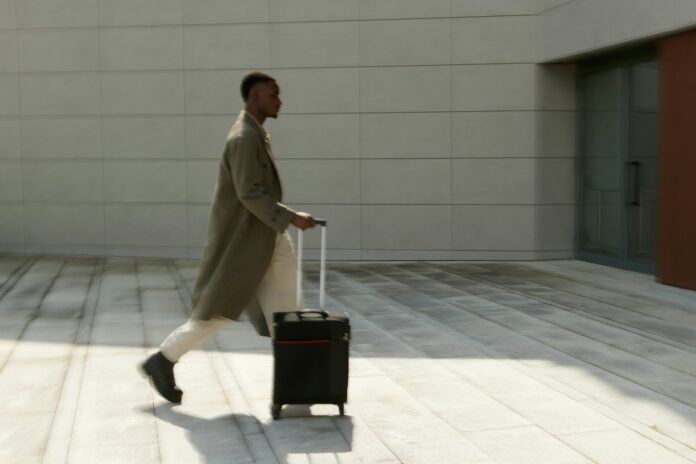Every year, new words enter the dictionary to encapsulate concepts which previously didn’t need defining. ‘Post truth’, for instance, was Oxford Dictionary’s word of the year in 2016 – particularly pertinent in a twelve months which saw Trump, Brexit and Fake News dominate and discombobulate the headlines. 2013 saw ‘selfie’ enter the popular lexicon, with ‘binge watch’ and ‘photobomb’ also being used (and performed) by young and old alike; a surefire sign of the times, we think.
Providing a hyphen is inserted, we wonder if 2026’s’s entry will be ‘digital nomad’. With more and more young people opting (or having their hand forced, depending on how you look at it) to live a transient lifestyle away from the traditional confines of the office walls and clock, it’s only a matter of time before this loose term becomes a genuine job description.
Making money in this marketplace, however, is tough; the economy required often limiting the sense of freedom that you signed up for in the first place. That said, there are certain things you can do to keep costs low and profit margins high, and these are a good place to start; our 8 money saving tips to help make digital nomadism work for you.
Cafe Costs
In a game of such fine margins, where responsibility for earning falls solely on your shoulders, every hidden cost should be calculated and factored into your budget. Let’s start with every digital nomad’s safe space; the coffee shop. Even the most patient barista is going to expect you to buy at least a couple of drinks when you’re bedding in, wires everywhere and laptops sprawled across tablespace. Weigh up how much money you’ll actually make from being there against the cost of all the teas, espressos and snacks you’ll likely be ordering.
Equally, if the cafe is a place of distraction, with weird Ed Sheeran covers and other digimads chatting loudly about anything but work on adjacent tables, consider if the coffee shop is really the place for you at all. Which brings us to…

Choose Your Temporary Home Wisely
Sure, opting for the cheapest possible place to rest your weary head makes sense. Perhaps a dorm room bunk in that cute beach hostel? Or even better, the free offer of a crash on your yoga instructor’s sofa. On paper at least, this is budget savvy behaviour.
But if you’re technically ‘at work’, the cost of such a shoestring choice will soon mount up. If you don’t have desk space and a semblance of WiFi, you’re going to be taking a day off, let’s not kid ourselves. But if your place is a comfortable, pleasant place to spend time in, equipped with office-like amenities and free from distraction, then the extra money you spend on rent will be recouped quickly. This is an investment, digital nomad style.
Of course, choosing your temporary home’s location wisely is crucial too. You want to be in a place where the cost of living is low, but with an infrastructure which will keep you well connected and content. And if you’ve got your heart set on turning this into a career, abandon the illusion that you’ll be seeing new wonders most weeks, always on the move and make. Staying stationary is where it’s at…

Economise Your Movements
Time really is money, and every day spent on the road is one spent not working. After all, you’re not travelling, you’re at work, however fluid or remote it may seem. Island hopping and rarely staying anywhere for more than a night or two will blow your brittle budget in record time, as you’ll be leaving yourself very little time to actually meet any deadlines you may have. When you do have to up sticks, surprisingly, flying internally is often not much more than coach travel, but in a fraction of the time.
Economise your movements at micro level, too. If the nearest coffee shop is a half hour scooter ride away, stay put and get your head down. You could’ve earned some coin in the time it took you to get from A to B. In general, itchy feet are the enemy of earning, make no mistake.
Read: How and where to store your belongings as a digital nomad

Plan Ahead For Taxes
As a digital nomad, you may still be required to pay taxes in your home country. It’s crucial to plan for this expense ahead of time to avoid a hefty tax bill at the end of the year. Consult with a tax professional to understand your obligations and potential deductions. The flip side of filing your own is that you may occasionally overestimate (always a good idea to err on that side, of course), and be due a tax refund.
Plugs Are Power
You’ll be able to identify a digital nomad by observing their behaviour when they enter a cafe. Eyes scanning furtively, perhaps even frantically, for a position close to a plug. Because everything runs on the strength of your battery, seeing it in the red can cause a whole day’s work to come crashing down. Always remember to charge all of your devices overnight, and choose workstations with ample plug provisions. Also, consider investing in a portable laptop battery charger – just remember to keep it charged. Simples.

Public WiFi Precautions
With no home, office, salary or the usual protections gainful employment affords you, keeping everything legit and profitable is a tightrope walk, each and every day. Having your computer’s security compromised could throw you seriously off balance.
Indeed, just because you’re using public wifi more, or the necessity grips you, doesn’t mean all norms of secure browsing should go out of the window. Check your emails, sure, your Facebook too, but leave anything transactional or balance checking based to a safer, password protected, non-shared connection.
Other precautionary measures apply; verify that the website you’re visiting is HTTPS before visiting and consider using a VPN, or even set up your own VPN router, to enable public WiFi connections to made private. Carrying a security audit on your website before travelling to make sure everything is as secure as possible is an extra blanket of safety to look into.
Read: 10 essential cyber security tips for travellers
Budget For The Lean Months
Unlike the salaried masses, your income won’t arrive in neat, predictable instalments on the last Friday of every month. Some weeks you’ll be flush; others, you’ll be refreshing your inbox waiting for that invoice to clear. This feast-or-famine cycle catches out even experienced freelancers, so building a buffer is non-negotiable.
Aim to keep at least two months’ worth of living expenses tucked away in an easily accessible account – three if you’re the cautious type. When a big payment lands, resist the urge to upgrade your accommodation or book that island-hopping trip immediately. Instead, skim a percentage off the top and funnel it straight into your safety net. You’ll thank yourself when a client ghosts on a project or that promised retainer falls through at the last minute.
Give Something Back
Living as a tourist in a place (typically) of lower than average income, earning money and trying to spend as little as possible…well, the ethics are a little questionable.
Bear this in mind in everything you do; treat the country you’re in with huge respect, engage with the culture and the people, learn a little of the language, at the very least. And give back; whether that’s via charity, volunteering or donating your skills to the community. Accept how lucky you are to have this freedom and pay your good fortune forward.





